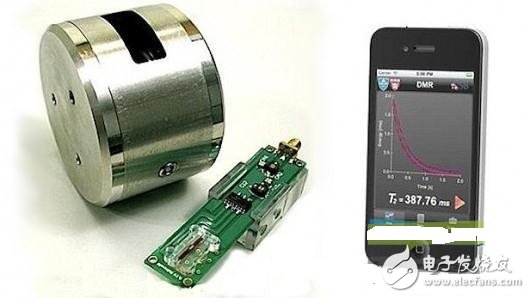It is commonly believed that your phone is filled with games like Angry Birds, fruit-cutting apps, and other time-consuming applications. But have you ever heard of a mobile app that can detect cancer? A groundbreaking application has recently been developed by scientists abroad. According to reports, once installed, this app allows doctors to determine whether a tumor is malignant or benign within 60 minutes. No need to visit the hospital or wait in line—just use your smartphone for a quick test and get an immediate diagnosis.

When a tumor is suspected, oncologists typically don't remove it right away. Instead, they extract a small sample of cells using a thick needle for pathological analysis. However, traditional methods—such as examining cell shapes or performing protein staining—can sometimes be inconclusive and take a long time. At Massachusetts General Hospital in Boston, a team led by Dr. Ralph Weissleder has developed a handheld magnetic resonance (DMR) diagnostic device that can identify cancer in just one hour with high accuracy. This technology offers a less invasive alternative to surgery or biopsy, significantly reducing patient discomfort.
So, what exactly is magnetic resonance?
In scientific terms, magnetic resonance works by using electromagnetic waves of a specific frequency to interact with atomic nuclei in a magnetic field. When these nuclei absorb energy from the electromagnetic waves, they emit their own signals—known as magnetic resonance signals. The frequency at which each nucleus absorbs and emits energy depends on its environment, allowing scientists to analyze the structure and composition of substances based on these signals.
To put it more simply, think of a compass. The Earth’s magnetic field causes the needle to align northward. If you place an electromagnet nearby and apply alternating current, the needle will vibrate. When the AC frequency matches the natural resonance frequency of the needle, it starts to oscillate more vigorously, absorbing more energy from the magnetic field. DMR technology works on a similar principle, detecting changes in magnetic energy when measuring samples in an alternating field.
Weissleder’s DMR system is the smallest cancer diagnostic tool in the world. It uses a compact permanent magnet (8 cm in diameter and 5.5 cm tall) instead of large superconducting magnets. This magnet generates a 0.5 Tesla field over a 1.2 cm radius, which, while weaker than typical MRI machines, is still 10,000 times stronger than Earth's magnetic field.
The DMR probe includes a microfluidic network, a sample chamber, and a microcoil. During testing, the biopsy sample is mixed with magnetic particle antibodies, and the microcoil applies an alternating magnetic field. The electronics consist of commercial components like microcontrollers, RF generators, and data acquisition units, all designed to fit into a compact module about 20 cm x 8 cm. The entire system is estimated to cost several thousand dollars.
How does this technology actually detect cancer?
The MGH team tested the method by attaching nanomagnetic particles to cancer-specific antibodies. When these labeled particles were mixed with cellular material from a patient’s biopsy, the antibodies bound to the cancer cells, marking them. In experiments with 50 cancer patients, the DMR system successfully identified 48 out of 50 cancer samples, proving its effectiveness in detecting cancer markers quickly and accurately.
Regular market series
Regular market series generators are a type of generator that is designed to provide a continuous and reliable source of power for commercial and industrial applications. These generators are typically used in settings where a constant and uninterrupted power supply is essential, such as hospitals, data centers, manufacturing facilities, and large commercial buildings.
Regular market series generators are known for their durability, efficiency, and long lifespan. They are built to withstand heavy usage and can operate continuously for extended periods of time without any issues. These generators are also designed to be fuel-efficient, helping to reduce operating costs and minimize environmental impact.
Regular market series generators come in a range of sizes and power capacities to meet the specific needs of different applications. They are often equipped with advanced features and technologies, such as automatic voltage regulation, remote monitoring and control, and noise reduction systems.
These generators are typically powered by diesel or natural gas engines, which provide a reliable and efficient source of energy. They are also equipped with various safety features, such as automatic shutdown systems and overload protection, to ensure safe and reliable operation.
Overall, regular market series generators are a reliable and cost-effective solution for providing continuous power in commercial and industrial settings. They offer a dependable source of energy, ensuring that critical operations can continue even during power outages or other disruptions.
silent diesel generator,home diesel generator,100kw home diesel generator,Solar generator
Grandwatt Electric Corp. , https://www.grandwattelectric.com